六年级英语上册知识点[1]
六年级英语上册知识点总结
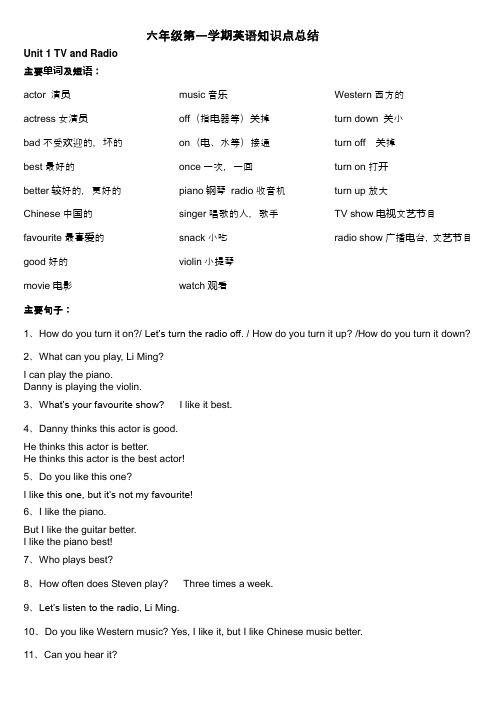
六年级第一学期英语知识点总结Unit 1 TV and Radio主要单词及短语:actor 演员actress女演员bad不受欢迎的,坏的best最好的better较好的,更好的Chinese中国的favourite最喜爱的good好的movie电影music音乐off(指电器等)关掉on(电、水等)接通once一次,一回piano钢琴radio收音机singer唱歌的人,歌手snack小吃violin小提琴watch观看Western西方的turn down 关小turn off 关掉turn on打开turn up放大TV show电视文艺节目radio show广播电台,文艺节目主要句子:1、How do you turn it on?/ Let’s turn the radio off. / How do you turn it up? /How do you turn it down?2、What can you play, Li Ming?I can play the piano.Danny is playing the violin.3、What’s your favourite show?I like it best.4、Danny thinks this actor is good.He thinks this actor is better.He thinks this actor is the best actor!5、Do you like this one?I like this one, but it’s not my favourite!6、I like the piano.But I like the guitar better.I like the piano best!7、Who plays best?8、How often does Steven play? Three times a week.9、Let’s listen to the radio, Li Ming.10、Do you like Western music? Yes, I like it, but I like Chinese music better.11、Can you hear it?12、Why is the radio playing Chinese music?13、Thanks for finding this radio show.14、Dinosaurs and people are different. I think dinosaurs and people are the same.15、What did you like best?I liked the dinosaur better than the rabbit, but I liked the snacks best.16、They order some food.17、Jenny wants Western food. “I would like a hamburger, French fries and milk, please.”18、I would like some Chinese food, please. I would like some noodles, dumplings and tea.19、There are many people at the restaurant.20、I can’t hear her. I can’t hear her either.重点语法复习:绝大多数形容词有三种形式,原级,比较级和最高级, 以表示形容词说明的性质在程度上的不同。
(六年级)六年级上册英语第一单元知识点

六年级上册英语第一单元知识点对于学前和小学生来说,培养英语学习兴趣,获取英语语感,形成标准的英语语音语调,养成大胆开口讲英语的习惯是最首要的。
下面给大家带来一些关于六年级上册英语第一单元知识点,希望对你们有所帮助。
人教版PEP小学英语六年级上册Unit1知识点梳理science [ saɪəns] 科学museum [mjuː zɪəm] 博物馆post office [pəʊst] [ ɒfɪs] 邮局bookstore [ bʊkstɔː] 书店cinema [ sɪnəmə] 电影院hospital [ hɒspɪt(ə)l] 医院crossing [ krɒsɪŋ] 十字路口turn [tɜːn] 转弯left [left] 左straight [streɪt] 笔直地right [raɪt] 右ask [ɑːsk] 问sir [sɜː] 先生interesting [ ɪntrəstɪŋ] 有趣的Italian [ɪˈtæljən] 意大利的restaurant [ˈrestərɒnt] 餐馆pizza [ piːtsə] 披萨饼street [striːt] 大街;街道get [get] 到达GPS 定位系统gave [ɡeɪv] (give的过去式) feature [ fiːtʃə] 特点follow [ fɒləʊ] 跟着far [fɑː] 较远的tell [tel] 告诉Unit 1 How can I get there重点:询问某地在哪里的问句及其答语询问怎样到某地的句型动词want的用法难点:能够问路并描述路线Wha引导的感慨句四会单词短语science科学museum博物馆bookstore书店cinema电影院hospital医院crossing十字路口tumn转弯left左straight笔直地right右post office邮局三会单词短语ask问sir(对男子的礼貌称呼)先生interesting有趣的Italian意大利的restaurant餐馆pizza比萨饼street大街;街道get到达GPS全球(卫星)定位系统gave(give的过去式)提供;交给feature特点follow跟着far较远的tell告诉get to到达in front of…在……前面惯用表达式1.Excuse me.打搅了。
六年级上册英语知识点归纳
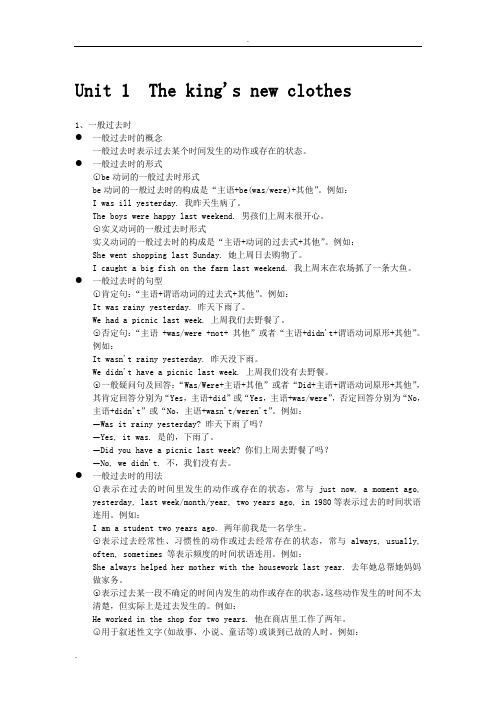
Unit 1 The king's new clothes1、一般过去时●一般过去时的概念一般过去时表示过去某个时间发生的动作或存在的状态。
●一般过去时的形式○1be动词的一般过去时形式be动词的一般过去时的构成是“主语+be(was/were)+其他”。
例如:I was ill yesterday. 我昨天生病了。
The boys were happy last weekend. 男孩们上周末很开心。
○2实义动词的一般过去时形式实义动词的一般过去时的构成是“主语+动词的过去式+其他”。
例如:She went shopping last Sunday. 她上周日去购物了。
I caught a big fish on the farm last weekend. 我上周末在农场抓了一条大鱼。
●一般过去时的句型○1肯定句:“主语+谓语动词的过去式+其他”。
例如:It was rainy yesterday. 昨天下雨了。
We had a picnic last week. 上周我们去野餐了。
○2否定句:“主语 +was/were +not+ 其他”或者“主语+didn't+谓语动词原形+其他”。
例如:It wasn't rainy yesterday. 昨天没下雨。
We didn't have a picnic last week. 上周我们没有去野餐。
○3一般疑问句及回答:“Was/Were+主语+其他”或者“Did+主语+谓语动词原形+其他”,其肯定回答分别为“Yes,主语+did”或“Yes,主语+was/were”,否定回答分别为“No,主语+didn't”或“No,主语+wasn't/weren't”。
例如:—Was it rainy yesterday? 昨天下雨了吗?—Yes, it was. 是的,下雨了。
—Did you have a picnic last week? 你们上周去野餐了吗?—No, we didn't. 不,我们没有去。
PEP六年级上册英语第一单元知识点
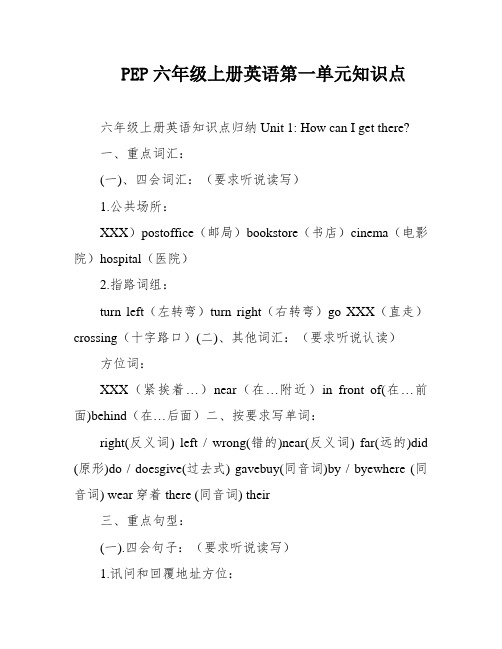
PEP六年级上册英语第一单元知识点六年级上册英语知识点归纳Unit 1: How can I get there?一、重点词汇:(一)、四会词汇:(要求听说读写)1.公共场所:XXX)postoffice(邮局)bookstore(书店)cinema(电影院)hospital(医院)2.指路词组:turn left(左转弯)turn right(右转弯)go XXX(直走)crossing(十字路口)(二)、其他词汇:(要求听说认读)方位词:XXX(紧挨着…)near(在…附近)in front of(在…前面)behind(在…后面)二、按要求写单词:right(反义词) left / wrong(错的)near(反义词) far(远的)did (原形)do / doesgive(过去式) gavebuy(同音词)by / byewhere (同音词) wear穿着there (同音词) their三、重点句型:(一).四会句子:(要求听说读写)1.讯问和回覆地址方位:--- Where is the XXX的商店在哪?---It’XXX在大门邻近。
2.问路和指路:--- How can we get there?我们怎样到那?--- XXX left XXX到书店左转。
(二).其他句子:(要求听说认读)1. Wu Yifan and Robin are looking at some robots.XXX和XXX正在看一些机器人。
2. I wan to buy a postcard.我想要去买一张明信片。
3. Excuse me, sir.先生打扰一下。
4. What a great museum!多么神奇的博物馆啊!5.It’XXX.它紧挨着书店。
6. There XXX.在我们城市有一个宠物病院。
7. What an interesting film!何等风趣的一部片子啊!8. It’s next to the XXX.在东方街,它紧挨着公园。
(精心归纳总结)六年级英语上册重点知识
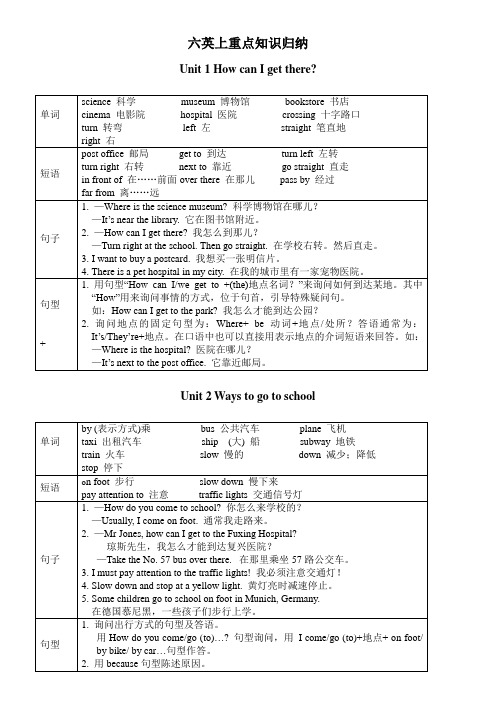
他喜欢猜字谜和远足吗?
—Yes, he does.是的,他喜欢。
句型
1.询问爱好的句型
固定句型:What is/are +one’s+ hobby/hobbies? (……有什么爱好?)
答语:人+like(s) doing…(……喜欢做……)
—She is a nurse.她是一名护士。
2.用句型“Where does+主语(第三人称单数)+work?”询问某人的工作地点。用句型“主语(第三人称单数)+works +(表示地点的)介词短语。”回答。如:
—Where does your father work?你爸爸在哪儿工作?
—He works in a car factory.他在一家汽车工厂工作。
wash clothes洗衣服draw pictures画画
make a snowman堆雪人go for a picnic去野餐
句子
1.—What are you going to do tomorrow?你明天打算做什么?
—I’m going to have an art lesson.我要上美术课。
5. Some children go to school on foot in Munich, Germany.
在德国慕尼黑,一些孩子们步行上学。
句型
1.询问出行方式的句型及答语。
用How do you come/go (to)…?句型询问,用I come/go (to)+地点+ on foot/ by bike/ by car…句型作答。
六年级英语上册知识点
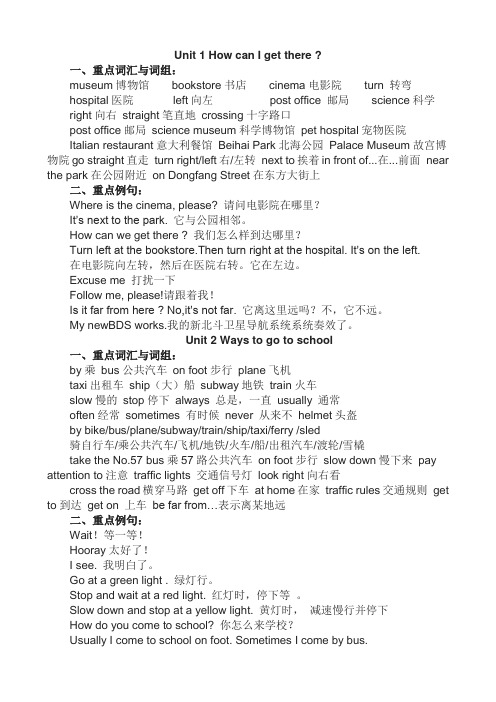
Unit 1 How can I get there ?一、重点词汇与词组:museum博物馆bookstore书店cinema电影院turn 转弯hospital医院left向左post office 邮局science科学right向右straight笔直地crossing十字路口post office邮局science museum科学博物馆pet hospital宠物医院Italian restaurant意大利餐馆Beihai Park北海公园Palace Museum故宫博物院go straight直走turn right/left右/左转next to挨着in front of...在...前面near the park在公园附近on Dongfang Street在东方大街上二、重点例句:Where is the cinema, please? 请问电影院在哪里?It’s next to the park. 它与公园相邻。
How can we get there ? 我们怎么样到达哪里?Turn left at the bookstore.Then turn right at the hospital. It’s on the left.在电影院向左转,然后在医院右转。
它在左边。
Excuse me 打扰一下Follow me, please!请跟着我!Is it far from here ? No,it’s not far. 它离这里远吗?不,它不远。
My newBDS works.我的新北斗卫星导航系统系统奏效了。
Unit 2 Ways to go to school一、重点词汇与词组:by乘bus公共汽车on foot步行plane飞机taxi出租车ship(大)船subway地铁train火车slow慢的stop停下always 总是,一直usually 通常often经常sometimes 有时候never 从来不helmet头盔by bike/bus/plane/subway/train/ship/taxi/ferry /sled骑自行车/乘公共汽车/飞机/地铁/火车/船/出租汽车/渡轮/雪橇take the No.57 bus乘57路公共汽车on foot步行slow down慢下来pay attention to注意traffic lights 交通信号灯look right向右看cross the road横穿马路get off下车at home在家traffic rules交通规则get to到达get on 上车be far from…表示离某地远二、重点例句:Wait!等一等!Hooray太好了!I see. 我明白了。
六年级上册英语1-4单元必考知识点总结

Unit 3 What are you going to do?
一.词汇 'next week 下周
newsp叩er 报纸
this morning 今天上午
comic book漫画书
Time: (时间)
this afternoon 今天下午 this evening今天晚上
magazine 杂志 dictionary 字典
make kites (making kites )制作风筝 colLect stamps (collecting stamps)集邮
三单
Live (lives)居住,住 teach (teaches)教 go (goes)去 watch (watches)看 read (reads)读
其他show (展览)
(交通工具前加by,表示乘坐但步行要用on foot)
三会一
fifth第五 difference 不同 country 国家 right右边的 Australia澳大利亚 if如果
remember 记住 same相同的 mean意思是
side 边 however 但是 must必须
find找到 every每个所有的 drive驾驶
do (does) pen pal(笔友)
dear (亲爱的)
look(看上去)fun(快乐,乐趣)
with(同…)
三、重点句型:
1 .询问某人的爱好:
---------- What's your hobby?你的爱好是什么?
-----------1 Like collecting stamps.我喜欢集邮 2 .表示征求别人意见:
我坐飞机去。
■ ----------- How does your father go to work? ----------- He goes to work by subway.
六年级上册英语全部知识点
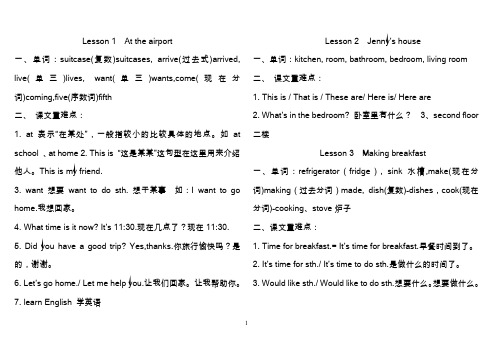
Lesson 1 At the airport一、单词:suitcase(复数)suitcases, arrive(过去式)arrived, live(单三)lives, want(单三)wants,come(现在分词)coming,five(序数词)fifth二、课文重难点:1. at表示“在某处”,一般指较小的比较具体的地点。
如at school 、at home2. This is “这是某某”这句型在这里用来介绍他人。
This is my friend.3. want 想要want to do sth. 想干某事如:I want to go home.我想回家。
4. What time is it now? It’s 11:30.现在几点了?现在11:30.5. Did you have a good trip? Yes,thanks.你旅行愉快吗?是的,谢谢。
6. Let’s go home./ Let me help you.让我们回家。
让我帮助你。
7. learn English 学英语Lesson 2 Jenny’s house一、单词:kitchen, room, bathroom, bedroom, living room二、课文重难点:1. This is / That is / These are/ Here is/ Here are2. What’s in the bedroom? 卧室里有什么?3、second floor 二楼Lesson 3 Making breakfast一、单词:refrigerator(fridge), sink水槽,make(现在分词)making(过去分词)made, dish(复数)-dishes,cook(现在分词)-cooking、stove炉子二、课文重难点:1. Time for breakfast.= It’s time for breakfast.早餐时间到了。
六年级英语上册module 1 知识点汇总
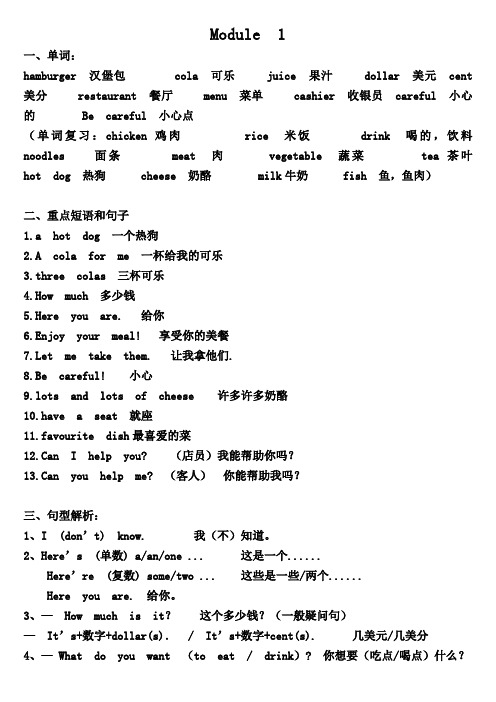
Module 1一、单词:hamburger 汉堡包cola 可乐 juice 果汁 dollar 美元cent 美分 restaurant 餐厅 menu 菜单 cashier 收银员careful 小心的 Be careful 小心点(单词复习:chicken鸡肉rice米饭drink喝的,饮料noodles面条meat肉vegetable蔬菜tea茶叶hot dog 热狗 cheese 奶酪milk牛奶fish 鱼,鱼肉)二、重点短语和句子1.a hot dog 一个热狗2.A cola for me 一杯给我的可乐3.three colas 三杯可乐4.How much 多少钱5.Here you are. 给你6.Enjoy your meal! 享受你的美餐7.Let me take them. 让我拿他们.8.Be careful! 小心9.lots and lots of cheese 许多许多奶酪10.have a seat 就座11.favourite dish最喜爱的菜12.Can I help you? (店员)我能帮助你吗?13.Can you help me? (客人)你能帮助我吗?三、句型解析:1、I (don’t) know. 我(不)知道。
2、Here’s (单数) a/an/one ... 这是一个......Here’re (复数) some/two ... 这些是一些/两个......Here you are. 给你。
3、—How much is it?这个多少钱?(一般疑问句)—It’s+数字+dollar(s)./ It’s+数字+cent(s). 几美元/几美分4、— What do you want (to eat / drink)? 你想要(吃点/喝点)什么?—I want (a/an/some)+食物/饮料+(,please). 我想要......四、可数名词和不可数名词:可数名词有单数和复数之分。
英语六年级上学期知识点
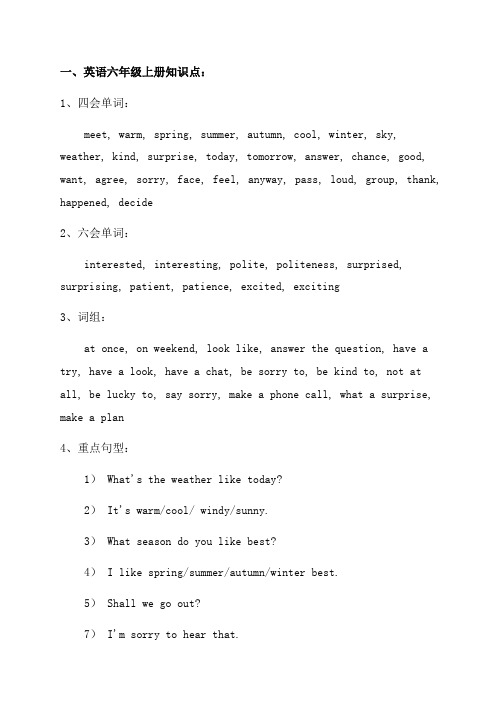
一、英语六年级上册知识点:1、四会单词:meet, warm, spring, summer, autumn, cool, winter, sky, weather, kind, surprise, today, tomorrow, answer, chance, good, want, agree, sorry, face, feel, anyway, pass, loud, group, thank, happened, decide2、六会单词:interested, interesting, polite, politeness, surprised, surprising, patient, patience, excited, exciting3、词组:at once, on weekend, look like, answer the question, have a try, have a look, have a chat, be sorry to, be kind to, not at all, be lucky to, say sorry, make a phone call, what a surprise, make a plan4、重点句型:1) What's the weather like today?2) It's warm/cool/ windy/sunny.3) What season do you like best?4) I like spring/summer/autumn/winter best.5) Shall we go out?7) I'm sorry to hear that.9) I'd love to.10) I agree with you.11) I disagree with you.12) What happened?13) Would you like to join us?14) I'm sorry, I can't.15) I'd like to have a try.16) It sounds exciting.17) What a surprise!18) Let's decide together.19) Let's make a plan.20) Shall we have a chat?二、六年级上册语法知识:1、紧缩形式:I'm = I amShe's = She isHe's = He isYou're = You are2、疑问句:Shall we go? 咱们去吗?Would you like to join us? 你想加入我们吗?What's the weather like today? 今天天气怎么样?What season do you like best? 你最喜欢哪个季节?3、情态动词:Can 能;可以Must 必须Mustn't 不可以Should 应该Shouldn't 不该4、动词的时态:一般现在时:表示动作发生的经常性或习惯一般过去时:表示动作已经发生以及有的结果5、There be 句型:There is a lake in the park. 公园里有一个湖There are many flowers in the garden. 花园里有许多花6、代词:I我You 你,你们He他She 她It它We我们They 他们7、祈使句:Let's go! 咱们走吧!Let's make a plan. 咱们来制定一个计划吧。
六年级英语知识点上册笔记
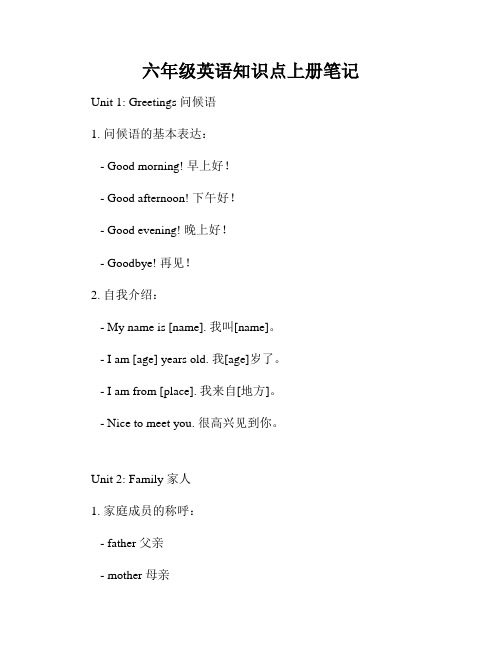
六年级英语知识点上册笔记Unit 1: Greetings 问候语1. 问候语的基本表达:- Good morning! 早上好!- Good afternoon! 下午好!- Good evening! 晚上好!- Goodbye! 再见!2. 自我介绍:- My name is [name]. 我叫[name]。
- I am [age] years old. 我[age]岁了。
- I am from [place]. 我来自[地方]。
- Nice to meet you. 很高兴见到你。
Unit 2: Family 家人1. 家庭成员的称呼:- father 父亲- mother 母亲- brother 兄弟- sister 姐妹- grandfather 祖父- grandmother 祖母2. 表示家人关系的句子:- This is my father. 这是我的爸爸。
- She is my sister. 她是我的姐姐。
- His grandmother is very kind. 他的祖母人很好。
Unit 3: School Life 学校生活1. 学科名称:- Chinese 语文- Math 数学- English 英语- Science 科学- History 历史2. 表示学习活动的句子:- I study Chinese every day. 我每天学习语文。
- We have math class in the morning. 我们上午有数学课。
- Our English teacher is very friendly. 我们的英语老师很友好。
Unit 4: Daily Routines 日常生活1. 时间表达方法:- in the morning 早上- in the afternoon 下午- in the evening 晚上- at night 在晚上2. 描述日常活动的句子:- I get up at 7 o'clock in the morning. 我早上7点起床。
六年级英语上册第一课知识点
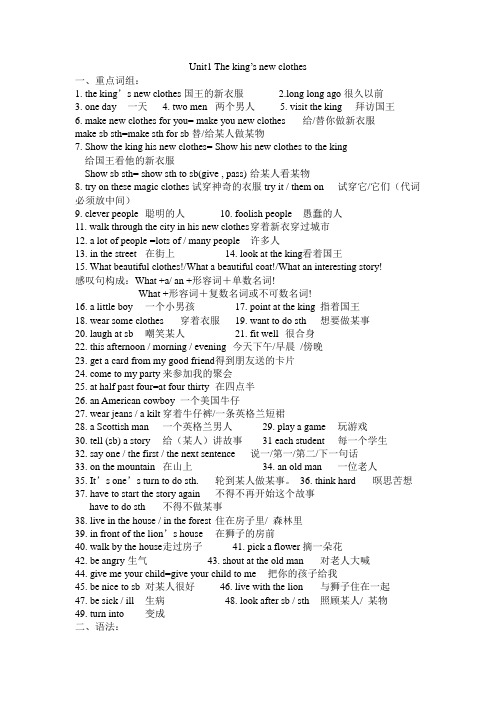
Unit1 The king’s new clothes一、重点词组:1. the king’s new clothes国王的新衣服2.long long ago很久以前3. one day 一天4. two men 两个男人5. visit the king 拜访国王6. make new clothes for you= make you new clothes 给/替你做新衣服make sb sth=make sth for sb替/给某人做某物7. Show the king his new clothes= Show his new clothes to the king给国王看他的新衣服Show sb sth= show sth to sb(give , pass) 给某人看某物8. try on these magic clothes试穿神奇的衣服try it / them on 试穿它/它们(代词必须放中间)9. clever people 聪明的人10. foolish people 愚蠢的人11. walk through the city in his new clothes 穿着新衣穿过城市12. a lot of people =lots of / many people 许多人13. in the street 在街上14. look at the king看着国王15. What beautiful clothes!/What a beautiful coat!/What an interesting story!感叹句构成:What +a/ an +形容词+单数名词!What +形容词+复数名词或不可数名词!16. a little boy 一个小男孩17. point at the king 指着国王18. wear some clothes 穿着衣服19. want to do sth 想要做某事20. laugh at sb 嘲笑某人21. fit well 很合身22. this afternoon / morning / evening 今天下午/早晨/傍晚23. get a card from my good friend得到朋友送的卡片24. come to my party 来参加我的聚会25. at half past four=at four thirty 在四点半26. an American cowboy 一个美国牛仔27. wear jeans / a kilt 穿着牛仔裤/一条英格兰短裙28. a Scottish man 一个英格兰男人29. play a game 玩游戏30. tell (sb) a story 给(某人)讲故事31 each student 每一个学生32. say one / the first / the next sentence 说一/第一/第二/下一句话33. on the mountain 在山上34. an old man 一位老人35. It’s one’s turn to do sth. 轮到某人做某事。
六年级英语上册第一单元知识点

六年级英语上册第一单元知识点一、词汇(Vocabulary)1. 学校设施(School Facilities)- library 图书馆- playground 操场- canteen 小卖部- computer room 计算机房- art room 美术室- music room 音乐室- gym 体育馆2. 学校科目(School Subjects)- Chinese 语文- English 英语- Maths 数学- Science 科学- History 历史- Geography 地理- PE (Physical Education) 体育3. 常见动词(Common Verbs)- read 阅读- write 写作- listen 听- speak 说话- play 玩- sing 唱歌- dance 跳舞4. 常见形容词(Common Adjectives)- happy 快乐的- sad 悲伤的- excited 兴奋的- bored 无聊的- tired 疲劳的- hungry 饥饿的- thirsty 口渴的二、语法(Grammar)1. 一般现在时(Simple Present Tense)- 描述习惯性动作或状态。
- 例句:I read books in the library every week.2. 现在进行时(Present Continuous Tense)- 描述正在进行的动作。
- 例句:She is listening to music in the music room.3. 可数名词与不可数名词(Countable and Uncountable Nouns)- 可数名词可以用数字计数,有单数和复数形式。
- 不可数名词通常没有复数形式,表示物质、概念等。
- 例句:I have two books. (可数) / Water is important for us. (不可数)4. 冠词的用法(Articles)- 定冠词“the” 用于特指的人或物。
人教版英语六年级上册一单元知识点
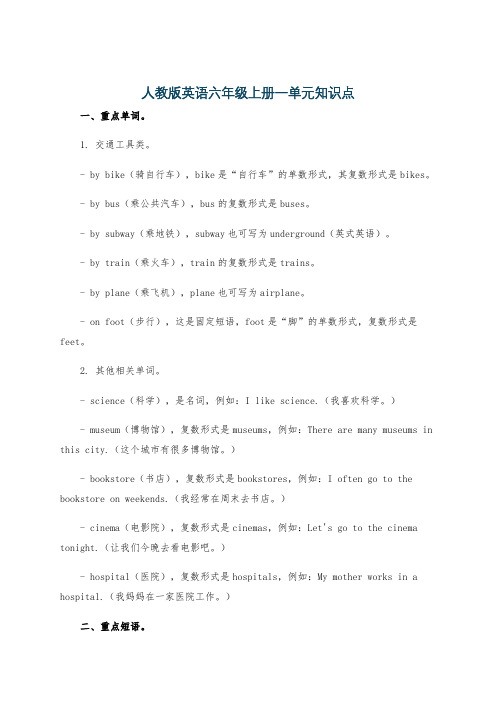
人教版英语六年级上册一单元知识点一、重点单词。
1. 交通工具类。
- by bike(骑自行车),bike是“自行车”的单数形式,其复数形式是bikes。
- by bus(乘公共汽车),bus的复数形式是buses。
- by subway(乘地铁),subway也可写为underground(英式英语)。
- by train(乘火车),train的复数形式是trains。
- by plane(乘飞机),plane也可写为airplane。
- on foot(步行),这是固定短语,foot是“脚”的单数形式,复数形式是feet。
2. 其他相关单词。
- science(科学),是名词,例如:I like science.(我喜欢科学。
)- museum(博物馆),复数形式是museums,例如:There are many museums in this city.(这个城市有很多博物馆。
)- bookstore(书店),复数形式是bookstores,例如:I often go to the bookstore on weekends.(我经常在周末去书店。
)- cinema(电影院),复数形式是cinemas,例如:Let's go to the cinema tonight.(让我们今晚去看电影吧。
)- hospital(医院),复数形式是hospitals,例如:My mother works in a hospital.(我妈妈在一家医院工作。
)二、重点短语。
1. 交通方式表达。
- take a bus(乘公共汽车),等同于by bus,但在句子中的用法有所不同。
例如:I take a bus to school. = I go to school by bus.(我乘公共汽车去上学。
)- take the subway(乘地铁),例如:He takes the subway to work every day.(他每天乘地铁去上班。
六年级上册英语unit 1 知识点总结

Unit 1 基础知识过关一、四会单词1.有魔力的2. 聪明的3. 愚蠢的4.穿过5. 笑,大笑6.穿7. 讲,叙述8. 每个9. 说10. 句子11. 迅速的,快的12. 下一个;接着,然后13.小的,年幼的14.机会15.想,思考16.努力地,费劲地;硬的17.孩子(复数) 18.开始二、四会词组1. 很久很久以前2. 对…喊叫3. 指着4. 笑他5. 为某人做衣服为我做衣服6. 拜访国王7. 给国王看他的新衣服8. 试穿9.这些神奇的衣服10.聪明的人11.变成一个王子12. 愚蠢的人13. 步行穿过城市14.穿着他的新衣服15.许多人16.在街上17. 看着国王18.(过去)有19.一个小男生20.指着国王21.住在两座山后面22. 照顾23. 很合身24.来参加我的聚会25.在四点半26. 每个学生27. 说一句话28. 说下一句29. (给某人) 讲故事30. 对某人说31.玩游戏32.在山上33. 该轮到某人了。
轮到某人做某事了34.努力想35. 下一个是什么?36. 移走两座大山37.开始这个故事38. 在森林里39. 在……前面40. 必须三、四会句型1.一天,两个人拜访了国王。
2. 这两个人给国王看了新衣服。
3. 我的国王,请试穿这些神奇的衣服。
4. 国王穿着他的新衣服步行穿过城市。
5. 一个小男孩指着国王,大笑。
6. 有很多人在街上。
7.很久很久以前,有一位国王。
7. Fox小姐和她的学生正在做游戏。
8. 每个学生说一句话。
9.一个老人和一个小男孩住在山上的房子里。
四、三会句型1.今天下午,我从我的好朋友Mark那里得到一张卡片。
2上面写到“四点半到公园来参加我的派对”。
3. 这是一个美国牧童。
4.这是一位苏格兰人。
他正穿着一件苏格兰短裙。
5.一个老人和一个小男孩住在山上的房子里。
be动词的过去式: am is are本单元出现的动词过去式:visit—( ) show—( ) walk—( ) look—( ) shout—( ) point—( ) laugh—( ) want—( ) pick—( ) turn—( ) like—( ) live—( ) get—( ) say—( ) tell—( )- 1 -。
六年级上册英语常用知识点
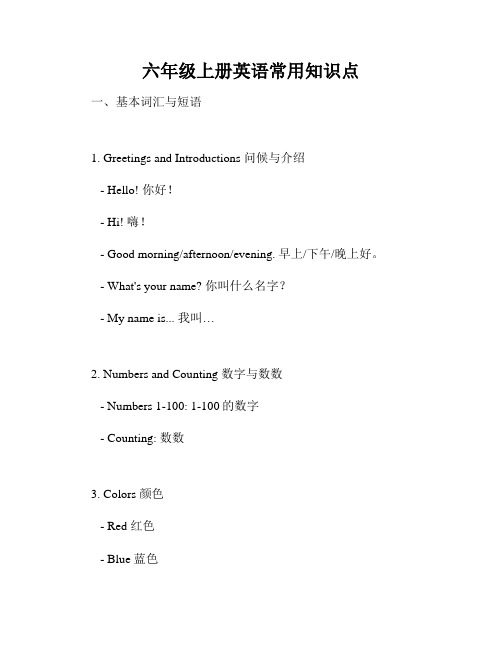
六年级上册英语常用知识点一、基本词汇与短语1. Greetings and Introductions 问候与介绍- Hello! 你好!- Hi! 嗨!- Good morning/afternoon/evening. 早上/下午/晚上好。
- What's your name? 你叫什么名字?- My name is... 我叫…2. Numbers and Counting 数字与数数- Numbers 1-100: 1-100的数字- Counting: 数数3. Colors 颜色- Red 红色- Blue 蓝色- Green 绿色- Yellow 黄色- Orange 橙色- Purple 紫色4. Days of the Week and Months of the Year 星期与月份 - Days of the Week: 星期- Months of the Year: 月份5. Family 家庭- Mother 母亲- Father 父亲- Sister 姐妹- Brother 兄弟二、基本语法1. Simple Present Tense 现在简单时- Affirmative, Negative, and Interrogative sentences: 肯定句、否定句、疑问句- Third person singular: 第三人称单数2. Present Continuous Tense 现在进行时- Affirmative, Negative, and Interrogative sentences: 肯定句、否定句、疑问句3. Question Words 疑问词- Who? 谁?- What? 什么?- When? 什么时候?- Where? 在哪里?- Why? 为什么?- How? 如何?4. Prepositions 介词- In, On, Under, Next to, Between: 在…里,在…上,在…下,在…旁边,在…之间三、日常用语与交际技巧1. Asking for Help 请求帮助- Could you please help me? 你能帮个忙吗?- Can you show me...? 你能给我看看…吗?- I need your assistance. 我需要你的帮助。
六年级上册英语一单元知识点总结
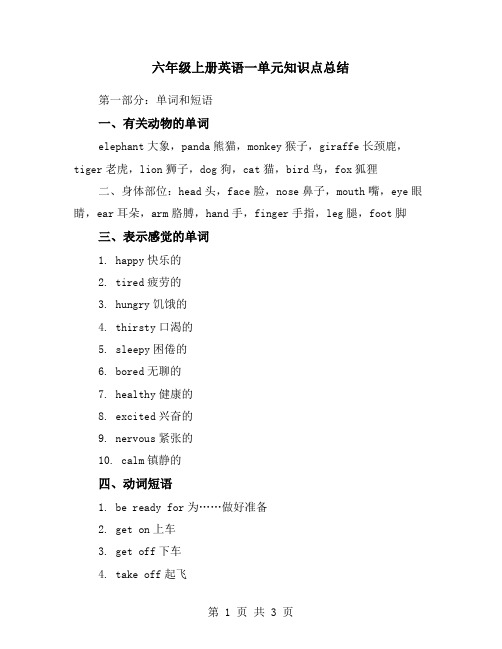
六年级上册英语一单元知识点总结第一部分:单词和短语一、有关动物的单词elephant大象,panda熊猫,monkey猴子,giraffe长颈鹿,tiger老虎,lion狮子,dog狗,cat猫,bird鸟,fox狐狸二、身体部位:head头,face脸,nose鼻子,mouth嘴,eye眼睛,ear耳朵,arm胳膊,hand手,finger手指,leg腿,foot脚三、表示感觉的单词1. happy快乐的2. tired疲劳的3. hungry饥饿的4. thirsty口渴的5. sleepy困倦的6. bored无聊的7. healthy健康的8. excited兴奋的9. nervous紧张的10. calm镇静的四、动词短语1. be ready for为……做好准备2. get on上车3. get off下车4. take off起飞5. look at看一看6. take photos拍照7. watch TV看电视剧/电视节目8. listen to听……说9. wait for等待……到来10. talk to/with和……交谈第二部分:句子结构与用法一、疑问句的结构和使用方法:疑问句一般有一般疑问句和特殊疑问句之分。
一般疑问句是以be动词、助动词、情态动词或do的某种形式开头,通常用来询问一件事情是否属实;特殊疑问句则以what、where、who、how等词开头,用来询问某事物的具体情况等。
在使用时要注意在句首加上疑问词。
二、There be句型的一般疑问句和特殊疑问句。
在一般疑问句中可以用do或does来代替be动词进行提问;在特殊疑问句中可以用来询问某地有什么人或某物。
在使用There be句型进行提问时,要将be 动词提到句首。
三、祈使句的结构和使用方法:祈使句主要由动词原形开头组成,用于向某人或某物发出命令或请求。
在使用祈使句时要注意使用肯定或否定的语气。
在使用祈使句进行提问时要在句首加上will。
- 1、下载文档前请自行甄别文档内容的完整性,平台不提供额外的编辑、内容补充、找答案等附加服务。
- 2、"仅部分预览"的文档,不可在线预览部分如存在完整性等问题,可反馈申请退款(可完整预览的文档不适用该条件!)。
- 3、如文档侵犯您的权益,请联系客服反馈,我们会尽快为您处理(人工客服工作时间:9:00-18:30)。
六年级期末复习大纲二六年级上册知识点Unit 1 How do you go to school?主要词组:by plane 坐飞机by ship 坐轮船on foot步行by bike 骑自行车by bus 坐公共汽车by train 坐火车traffic lights交通灯traffic rules交通规则Stop at a red light 红灯停Wait at a yellow light 黄灯等Go at a green light 绿灯行主要句子:How do you go to school?你怎么去上学?Usually I go to school on foot. Sometimes I go by bus.通常我步行去上学。
有时候骑自行车去。
How can I get to Zhongshan Park ?我怎么到达中山公园?You can go by the No. 15 bus.你可以坐15路公共汽车去。
知识点:1、There are many ways to go somewhere.到一个地方去有许多方法。
这里的ways一定要用复数。
因为there are是there be句型的复数形式。
2、get to到达.关于本单元我们还要学习与get相关的短语:get on 上车get off下车3、on foot 步行乘坐其他交通工具大都可以用介词by…, 但是步行只能用介词on 。
on foot 相当于walk,只是walk是动词。
by subway 和by train,注意区别。
by subway: 地铁,是有墙壁的。
by train: 火车,露天的。
4、go to school的前面绝对不能加the,这里是固定搭配。
但是go home回家,home前不加to。
5、USA 和US 都是美国的意思。
另外America也是美国的意思。
6 go to the park前面一定要加the.如果要去的地方有具体的名字,就不能再加the , 如果要去的地方没有具体名字,一定要在前面加the。
但go to school除外。
7、How do you go to …?你怎样到达某个地方?如果要问的是第三人称单数,则要用:H ow does he/she…go to …?8、反义词:get on(上车)---get off(下车) near(近的)—far(远的) fast(快的)—slow(慢的) because(因为)—why(为什么) same(相同的)—different(不同的)9、近义词:see you---goodbye sure---certainly---of course10、频度副词:always 总是,一直usually 通常often经常sometimes 有时候never 从来不11、The traffic lights are the same in every country. There are always three lights: red, yellow and green. 每个国家的交通灯是一样。
总是有三种:红,黄,绿。
12、China/ US中国和美国: the right side of the road 右边England/Australia英国和澳大利亚: the left side of the road 左边文化知识点:P12记住各个交通标志的意思。
Unit 2 Where is the science museum?主要单词:library 图书馆post office 邮局hospital医院cinema 电影院bookstore书店science museum科学博物馆turn left向左转turn right 向右转go straight 直行north北south南east东west西主要句子:Where is the cinema, please? 请问电影院在哪里?It’s next to the hospital. 它与医院相邻。
Turn left at the cinema, then go straight. It’s on the left.在电影院向左转,然后直行。
它在左边。
知识点:1、问路时要用―excuse me对不起,打扰一下‖2、描述路时可以用顺序词:first首先, next接着, then然后3、near 表示在附近,next to 表示与…相邻。
它的范围比near小。
in front of 在。
前面behind 在。
后面4、在左边,在右边介词要用on, on the left/on the right,但是东西南北,介词要用in, in the north/east/south/west.5、for 表示持续多长时间,当表示做某事多长时间都要用for. 如:Walk east for 5 minutes. Then walk straight for three minutes.6、乘几路车可以用by the No.301 bus, 注意No.中N要大写,后面要加点。
如果要用动词可以用take,例如take the No.301 bus.7、当表示某个地方在另一个地方的哪一方向时,要用介词of。
如:the hospital is east of the cinema. 医院在电影院的东边。
8、表示在哪儿转时,用介词at。
如:Turn left at the bank。
在银行左转。
9、find表示―找到‖,强调找的结果。
Look for 表示―寻找‖,强调找的过程。
10、在几点前面要用介词at,如at 7p.m.11、英文的书信与中文的书信不完全一样:开头:英语是在人称后面加逗号,中文是加冒号。
正文:英语是空三个或者五个字母写,中文要空两个中文字格。
结尾:英语的落款与人名是顶格而且是分开写的。
中文则是另起一行,放在一起且稍靠后一点儿的地方。
英文名字的书写要注意下。
12、近义词:bookstore==bookshop 书店go straight==go down直行after school==after class 放学后13、反义词或对应词:here (这里)---there(那里) east(东)---west(西) north(北)---south(南)left(左)---right(右) get on (上车)---get off(下车)14、in the front of…表示在…的前面,是指在该地方的范围内,in front of而则表示在该地方的范围外。
如:in front of our classroom是指在教室的外面而且在教室的前面。
而in the front of classroom则是指在教室里的前面。
15、be far from…表示离某地远. be 可以是am , is ,are。
介词要用from。
如:I am far from school now.我现在离学校很远。
My home is not far from school.我家离学校不远。
Unit 3 What are you going to do ?主要单词:this morning 今天上午this afternoon 今天下午this evening 今天晚上next week 下周tomorrow 明天tonight 今晚post card 明信片comic book漫画书newspaper报纸主要句子:What are you going to do on the weekend?你周末打算做什么?I’m going to visit my grandparents this weekend?这个周末我打算去看望我的外祖父母。
Where are you going this afternoon? 你今天下午打算去哪里?I’m going to the b ookstore.我打算去书店。
What are you going to buy?你打算去买什么?I’m going to buy a comic book。
我打算去买一本漫画书。
知识点:1、What are you going to do?你想做什么?询问他人在未来的打算。
be going to 后面要跟动词的原形。
注意be going to be 意思是―打算成为什么,干什么职业。
‖注意一下句子的区别,找出正确回答。
What are you going to do this afternoon?What are you going to buy?What are you going to be?When are you going?Where are you going?How are you going?Who are you going with?2、this evening 和tonight的区别:this evening指的是今天晚上睡觉以前的时间,一般指晚上十二点以前。
而tonight指的是今晚,一般是指一整晚的时间,通宵。
3、P30写周末的作文的模板4、部分疑问代词的意义与用法:(1)What 什么。
用来问是什么,做什么,叫什么,什么样等等。
如:What is your name? 你的名字叫什么?What is your father? 你爸爸是干什么的?What is your hobby?你的爱好是什么?What is your favourite food?你最喜爱的食物是什么?What’s your math teacher like? 你的数学老师长得什么样子?(2)Where , 在哪里,到哪里。
用来问地点。
如:Where are you from?你从哪里来?Where are you going to ?你打算去哪里?Where is my ruler?我的尺子在哪里?(3)When,什么时候。
用来问时间。
如:When is your birthday? 你的生日是什么时候?When are you going to ?你打算什么时候去?When do you go to school?你什么时候去上学?(4)what time 几点了。
用来问具体的时间,如:What time is it? 现在几点了?(5)What colour什么颜色。
用来问物体的颜色。
如:What colour is your schoolbag?你的书包是什么颜色的?(6)What kind of 什么种类。
用来问类别。
如What kind of fruit do you like?你最喜欢哪一种水果?(7)who谁。
